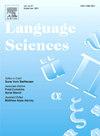动作视域下的语言相对性:语言与认知的纠缠
IF 1.1
2区 文学
Q2 EDUCATION & EDUCATIONAL RESEARCH
引用次数: 0
摘要
我们试图将语言相对性(LR)和认知科学中的主动方法联系起来。我们将20世纪90年代中期以后开始的当代LR研究与该领域的早期方法区分开来。当前研究的特点是植根于心理语言学传统的细致入微的方法。在对早期研究进行改进的同时,他们也远离了以哲学为导向的关于语言和认知之间关系的讨论,转而关注于实验测试特定认知领域的相对论效应。我们认为,这一过程保留了经典认知科学的一些基本假设,而恰恰是那些受到行为视角挑战的假设。这些包括对心智模块化的承诺和对认知领域之间相互作用的计算理解。我们认为,当代LR研究实际上与这些经典认知主义思想兼容,尽管表面上存在紧张点。然后,我们回顾了认知科学中最近的后认知主义语言研究方法,并探索了LR和活动框架相互丰富的方法。虽然语言的结构或范畴方面是LR研究的核心,但这些方面在后认知主义方法中通常被淡化,往往受到一阶语言实践和二阶结构之间的整合主义区分的影响。我们提出了一个具体的动态视角,旨在保留语言的系统特征,同时在多个时间尺度上将它们整合到语言与认知之间关系的动态理解中。本文章由计算机程序翻译,如有差异,请以英文原文为准。
Linguistic relativity from an enactive perspective: the entanglement of language and cognition
We seek to relate the fields of linguistic relativity (LR) and the enactive approach in cognitive science. We distinguish contemporary research on LR, starting after the mid-1990s, from earlier approaches to the field. Current studies are characterised by a nuanced methodology rooted in the psycholinguistics tradition. While improving on earlier research, they also move away from philosophically oriented discussions about the relation between language and cognition and focus instead on experimentally testing relativistic effects for specific cognitive domains. We claim that this procedure retains some fundamental assumptions from classical cognitive science, precisely those that are challenged by an enactive perspective. These include a commitment to the modularity of mind and a computational understanding of the interactions between cognitive domains. We contend that contemporary LR research is, in fact, compatible with these classical cognitivist ideas, despite superficial points of tension. We then survey recent post-cognitivist approaches to language in cognitive science and explore ways in which LR and the enactive framework could be mutually enriched. Whereas the structural or categorial aspects of language are central for LR research, these are usually downplayed in post-cognitivist approaches, often influenced by the integrationist distinction between first-order linguistic practices and second-order constructs. We advance a specifically enactive perspective that seeks to preserve the systematic features of language while also integrating them within a dynamical understanding of the relation between language and cognition at multiple timescales.
求助全文
通过发布文献求助,成功后即可免费获取论文全文。
去求助
来源期刊

Language Sciences
Multiple-
CiteScore
2.90
自引率
0.00%
发文量
38
期刊介绍:
Language Sciences is a forum for debate, conducted so as to be of interest to the widest possible audience, on conceptual and theoretical issues in the various branches of general linguistics. The journal is also concerned with bringing to linguists attention current thinking about language within disciplines other than linguistics itself; relevant contributions from anthropologists, philosophers, psychologists and sociologists, among others, will be warmly received. In addition, the Editor is particularly keen to encourage the submission of essays on topics in the history and philosophy of language studies, and review articles discussing the import of significant recent works on language and linguistics.
 求助内容:
求助内容: 应助结果提醒方式:
应助结果提醒方式:


